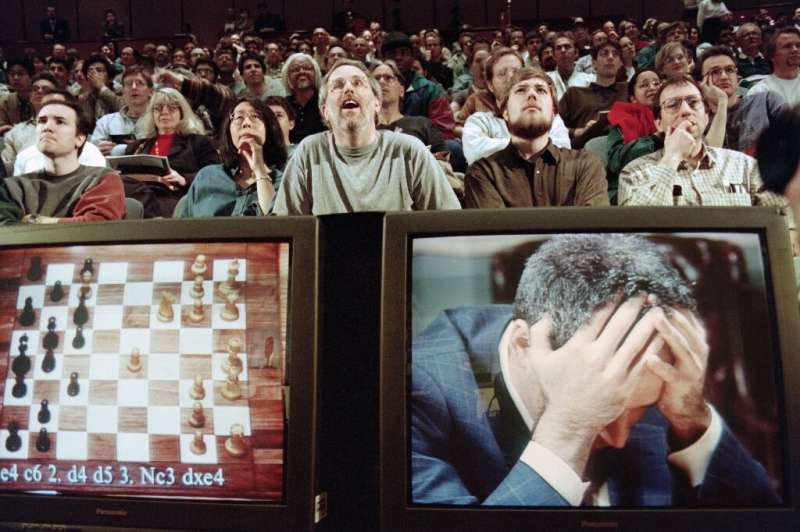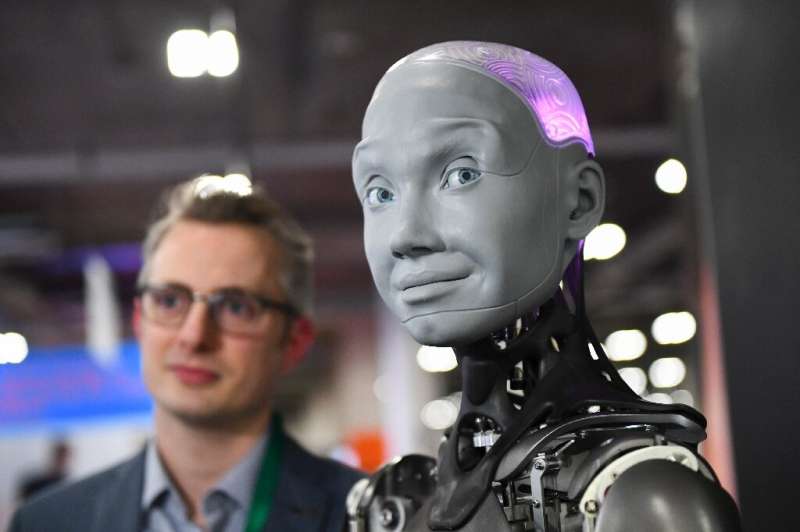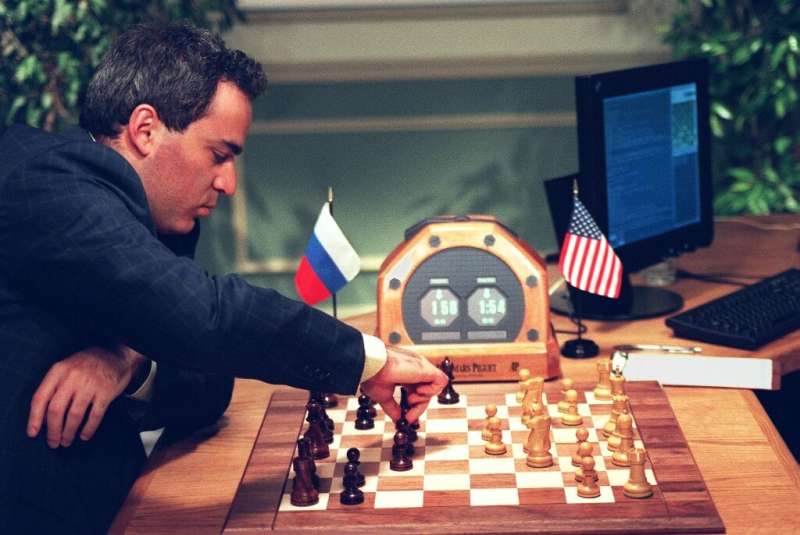

The 1997 chess game that thrust AI into the spotlight
source link: https://techxplore.com/news/2022-05-chess-game-ai-spotlight.html
Go to the source link to view the article. You can view the picture content, updated content and better typesetting reading experience. If the link is broken, please click the button below to view the snapshot at that time.

May 11, 2022
The 1997 chess game that thrust AI into the spotlight
by Cedric Simon, Laurent Barthelemy and Joseph Boyle
 The chess world was shocked at Garry Kasparov's defeat in New York in 1997.
The chess world was shocked at Garry Kasparov's defeat in New York in 1997.
With his hand pushed firmly into his cheek and his eyes fixed on the table, Garry Kasparov shot a final dark glance at the chessboard before storming out of the room: the king of chess had just been beaten by a computer.
May 11, 1997 was a watershed for the relationship between man and machine, when the artificial intelligence (AI) supercomputer Deep Blue finally achieved what developers had been promising for decades.
It was an "incredible" moment, AI expert Philippe Rolet told AFP, even if the enduring technological impact was not so huge.
"Deep Blue's victory made people realise that machines could be as strong as humans, even on their territory," he said.
Developers at IBM, the US firm that made Deep Blue, were ecstatic with the victory but quickly refocused on the wider significance.
"This is not about man versus machine. This is really about how we, humans, use technology to solve difficult problems," said Deep Blue team chief Chung-Jen Tan after the match, listing possible benefits from financial analysis to weather forecasting.
Even Chung would have struggled to comprehend how central AI has now become—finding applications in almost every field of human existence.
"AI has exploded over the last 10 years or so," UCLA computer science professor Richard Korf told AFP.
"We're now doing things that used to be impossible."
'One man cracked'
After his defeat, Kasparov, who is still widely regarded as the greatest chess player of all time, was furious.
 AI has come a long way since Deep Blue's chess victory in 1997, with the technology used in everything from financial analysis to weather forecasting.
AI has come a long way since Deep Blue's chess victory in 1997, with the technology used in everything from financial analysis to weather forecasting.
He hinted there had been unfair practices, denied he had really lost and concluded that nothing at all had been proved about the power of computers.
He explained that the match could be seen as "one man, the best player in the world, (who) has cracked under pressure".
The computer was beatable, he argued, because it had too many weak points.
Nowadays, the best computers will always beat even the strongest human chess players.
AI-powered machines have mastered every game going and now have much bigger worlds to conquer.
Korf cites notable advances in facial recognition that have helped make self-driving cars a reality.
Yann LeCun, head of AI research at Meta/Facebook, told AFP there had been "absolutely incredible progress" in recent years.
LeCun, one of the founding fathers of modern AI, lists among the achievements of today's computers an ability "to translate any language into any language in a set of 200 languages" or "to have a single neural network that understands 100 languages".
It is a far cry from 1997, when Facebook didn't even exist.
Machines 'not the danger'
Experts agree that the Kasparov match was important as a symbol but left little in the way of a technical legacy.
 Since Deep Blue's chess victory against Garry Kasparov in 1997, AI has continued to demonstrate its ability to surpass human beings in increasingly complex tasks.
Since Deep Blue's chess victory against Garry Kasparov in 1997, AI has continued to demonstrate its ability to surpass human beings in increasingly complex tasks.
"There was nothing revolutionary in the design of Deep Blue," said Korf, describing it as an evolution of methods that had been around since the 1950s.
"It was also a piece of dedicated hardware designed just to play chess."
Facebook, Google and other tech firms have pushed AI in all sorts of other directions.
They have fuelled increasingly powerful AI machines with unimaginable amounts of data from their users, serving up remorselessly targeted content and advertising and forging trillion-dollar companies in the process.
AI technology now helps to decide anything from the temperature of a room to the price of vehicle insurance.
Devices from vacuum cleaners to doorbells come with arrays of sensors to furnish AI systems with data to better target consumers.
While critics bemoan a loss of privacy, enthusiasts believe AI products just make everyone's lives easier.
Despite his painful history with machines, Kasparov is largely unfazed by AI's increasingly dominant position.
"There is simply no evidence that machines are threatening us," he told AFP last year.
"The real danger comes not from killer robots but from people—because people still have a monopoly on evil."
Explore further
© 2022 AFP
Recommend
-
 22
22
香港也许不必再出一个李嘉诚,却期待成批的改革者
-
 42
42
Paradoxes of Material Implication Peter Suber , Philosophy...
-
 62
62
随想 - @anypwx - 内心还是喜欢那时候的年代,回到 5 岁那年从新开始
-
 42
42
Alec Sharp, in the recent book Smalltalk by Example , points up a very valuable lesson in few words: Procedural code gets information then make...
-
 13
13
nvidia并行计算库thrust测试
-
 13
13
Thrust yourself to the top of an IT hiring search with this CompTIA security certification collection
-
 4
4
DeFi Automatic Portfolio Builder, Taking Crypto By a Storm – CryptoMode Search Thrust is a DeFi platform which allows holders to passively build a portfolio through community dec...
-
 4
4
13 Fascinating Facts About The Thrust SSC, The World's Fastest Land Vehicle ...
-
 6
6
Real-time data and AI thrust manufacturing into the future
-
 9
9
Sam Altman Defends AI Thrust Days After Retaking OpenAI’s HelmSaritha RaiTue, December 12, 2023, 1:15 PM GMT+9·3 min read
About Joyk
Aggregate valuable and interesting links.
Joyk means Joy of geeK